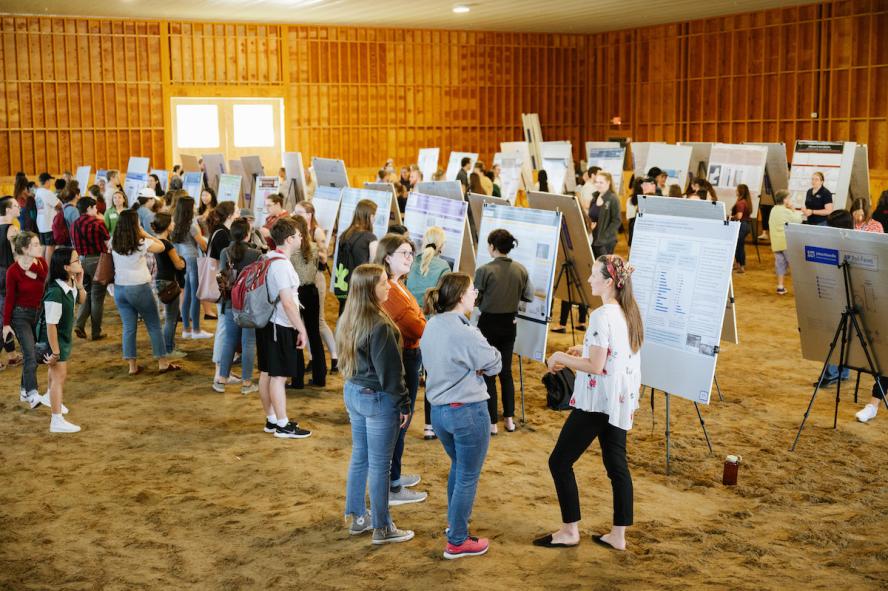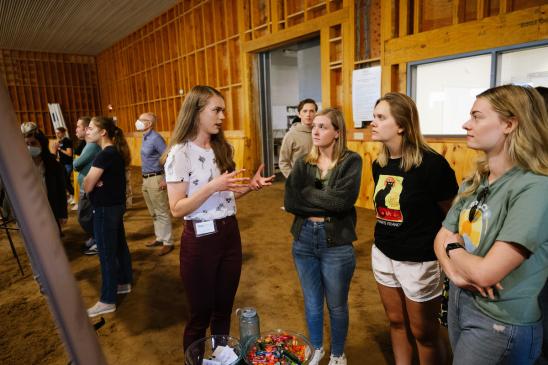-
About
- Leadership & Faculty
- News & Events
-
Academics
- Graduate
- Advanced Clinical Training
- Continuing Education
- Academic Departments
- Academic Offices
- Simulation Experiences
-
Student Life
- Offices
-
Research
-
Hospitals & Clinics
- Emergency Care
- Hospital Services
-
Community Outreach
- Volunteer
United We Stand as Research Expands
Cummings School collaboration with MIT increases research opportunities for both institutions

A partnership between Cummings School of Veterinary Medicine at Tufts University and the Massachusetts Institute of Technology is helping to expand and diversify research opportunities at each institution.
Only in its first year, the collaboration is already paying dividends, according to Dr. Cheryl London, V90, Cummings School’s Associate Dean of Research and Graduate Education and the Anne Engen and Dusty Professor in Comparative Oncology.
“As a result of the partnership the students have become more connected with a true basic science research experience at MIT, with access to laboratories and training in other animal model systems,” she explains. “MIT has a large marmoset colony, (a small monkey native to Central and South America) and several ongoing research projects led by veterinarian scientists. Together, these expand the breadth of potential resources for veterinary students to learn about careers in research.”
The veterinary students also work with postdoctoral veterinary fellows that are training in laboratory animal medicine, a field essential to support biomedical research efforts. Importantly, this provides bidirectional connection across both institutions that helps build enthusiasm for future veterinary workforce development, a crucial element within the research enterprise.
The Division of Comparative Medicine (DCM) at MIT, led by Dr. Kelly Metcalf Pate, operates a training program for veterinarians in laboratory animal medicine. The DCM also historically ran a separate student summer research program, during which D.V.M. students from around the country would work in an MIT laboratory and gain exposure to basic research.
When London became associate dean in 2020, she planned to apply for a Ruth L. Kirshstein National Research Service Award Short-Term Institutional Research Training Grant (known as a T35) from the National Institutes of Health (NIH). According to the NIH, such grants are used “to develop or enhance research training opportunities for individuals interested in careers in biomedical, behavioral, and clinical research.” Typically, the T35 is used to support immersive short-term research experiences for students in a health professional school over the summer.
Dr. London had previously established communication with the DCM at MIT under its prior leadership (Dr. Jim Fox) then met with Dr. Metcalf Pate when she took over directorship of the program. At her previous institution, Johns Hopkins University, Dr. Metcalf Pate, was co-leader of an NIH T35 award and gained substantial experience in this setting. “We met and decided to develop a partnership to leverage our strengths,” London shares.
The two institutions worked together and submitted a successful T35 grant application in the fall of 2021 with funding awarded in July 2022. “It was the first joint application funded by the NIH for this grant,” London contends.
The goal of the summer research experience, according to Drs. London and Metcalf Pate, is to provide veterinary students with an immersive experiential biomedical research experience.
"Most students come to veterinary school with the goal of working in the private practice setting, but there are great opportunities in research that many students are unaware of,” says London. “The T35 training program is designed to broaden exposure and get them excited about biomedical research.”
The first cross-institutional summer program took place this past summer, with participation of 38 students, eight of which were directly funded by the T35. This included field trips where students traveled to different sites and learned about research operations across several landscapes, including private industry and other academic research environments. Joint career chats by practicing veterinarians in different capacities of research also provided students with new perspectives to consider.
The Summer Program culminated in Cummings School’s Annual Research Day on September 2 where the students showcased their research in the form of poster presentations.
“I went into this research for a few reasons,” says Rachel Kanefsy, V24, who was among the students recognized by the judges for one of the top projects, titled Mucin 4 is a Marker of Bronchitis and Bronchiolitis in Influenza A Virus Infection.
“I was partnered with the USDA in Ames by the program I joined, and this was the research I was paired with due to my interest in pigs and my love of work that has an impact on public health. I learned a lot about government work, new pathology techniques, and I am developing an interest in pursuing a Ph.D. after I graduate.”
Hannah Reichert, V24, earned recognition for one of the top Research Day projects for “Hepatic Cytokine Profile of Alcohol-fed, IL-1β Transgenic Mice: a Potential Model of Alcoholic Steatohepatitis.” With an interest in pathology, Hannah decided to explore the pathogenesis of alcoholic steatohepatitis.
“My research gave me insight into the responsibilities of a veterinarian in a setting that differs greatly from general practice,” Hannah explains. “Although the results often left me with more questions than answers, I realized that this is part of the process and what keeps research interesting. Overall, the experience helped solidify my decision to specialize in pathology. Investigation of the underlying mechanisms may lead to new developments that can be used to treat the disease or even prevent it in the first place, which is one of the ways I hope to make an impact as a veterinarian.”
Nicole Moyer, V25, presented her project, “Using Extracellular Vesicles to Treat Progressive Canine Mitral Valve Degeneration,” selected by the judges among the top projects presented at Veterinary Research Day. “Through the summer research program, I read and discussed scientific journals, attended bi-weekly cardiology rounds with clinicians at the hospital, and learned molecular biology lab techniques such as cell culture, RNA and protein extraction, PCR, and Western Blot,” says Nicole.
“I want to become a small animal surgeon, and research is a part of residency,” she adds. “Also, research rarely ever works out the way you want it to, so it's an excellent opportunity to learn to adapt when things don’t go as planned.”
Both first- and second-year students were required to attend the Research Day event that also included posters from graduate students, postdoctoral fellows, and house officers/residents. “By engaging students early in their training, we hope to get more of them excited about different career options” says London.
Pleased with the success of the inaugural year of collaboration, Drs. London and Metcalf-Pate hope to expand in the future. “We’d like to have participation from veterinary schools across the country and increase our footprint with respect to diversity, equity, and inclusion efforts.”
Department:
D.V.M. Program
